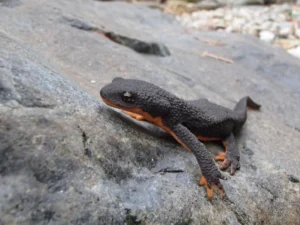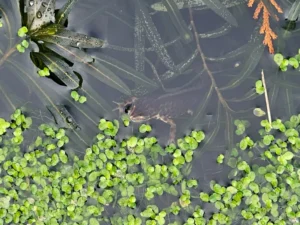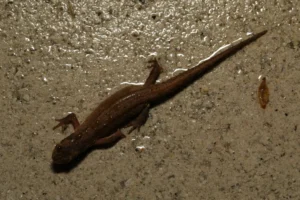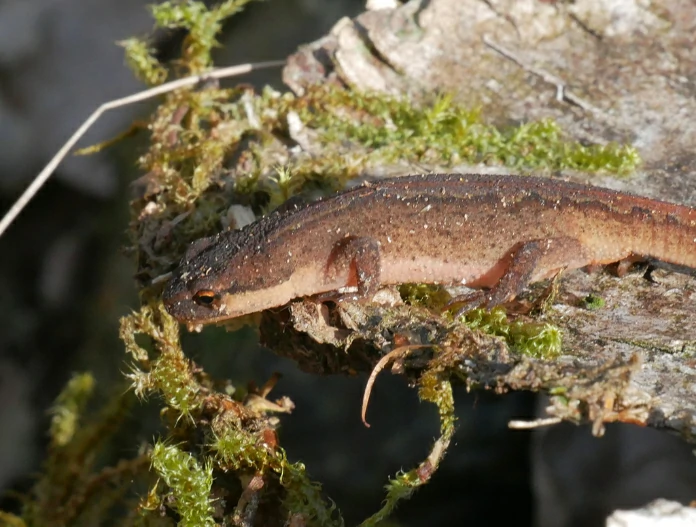On a quiet evening near a pond, you might spot a small, slippery creature gliding slowly through the water. Its skin looks smooth or slightly bumpy, and its tiny eyes seem to follow every ripple. You might wonder: are newts blind?
Newts are not blind, but their vision is limited. They can notice movement and shapes in water and on land. They also rely on their sensitive skin and strong sense of smell to find food, avoid predators, and locate mates.
How Do Newts See the World Around Them?
Newts have small, round eyes that help them pick up movement more than small details.

They cannot see colors as clearly as humans, but they notice changes in light and dark very well. This helps them detect predators, find prey, and locate other newts in ponds and streams.
Even in murky water, their eyes are sensitive enough to catch small movements nearby.
Their eyes sit high on their heads, giving them a wide view above and around them while swimming. This is handy when they are hunting near plants or peeking above the water.
Why Is Newt Vision Limited?
Even though newts can see, their eyesight is not sharp. They cannot focus on tiny details far away.
Instead, their eyes are tuned for motion. If an insect wiggles nearby, a newt can notice it almost instantly.
This type of vision works well in the shallow, often murky ponds and streams where they live.
Their limited eyesight also keeps them from wasting energy on things they cannot interact with.
Instead, they focus on what moves and what matters for survival.
How Do Newts Use Other Senses to Help Them?
Because their vision is limited, newts rely a lot on their other senses.
Their skin is very sensitive and can pick up vibrations in the water. This helps them sense predators, prey, or even other newts swimming nearby.

They also have a strong sense of smell. Smells in the water, including chemical signs, tell them where mates are, who is close, and even if danger is near.
Even though their eyes are not perfect, these extra senses make sure they can hunt, hide, and live safely.
How Do Newts Hunt?
Newts are patient hunters.
They float slowly, barely moving their tails, while they watch for the slightest ripple in the water. If a worm or insect moves nearby, the newt picks up the vibration and smell, then locks onto it with its eyes.
It moves closer, then snaps its prey with a quick bite. Even with limited eyesight, the mix of senses makes them strong hunters.
Young newts hunt the same way, learning to stay still and notice small vibrations in the water as they grow.
How Do Newts Avoid Predators?
Newts are small, so fish, birds, and bigger amphibians may try to eat them.
When danger comes close, a newt notices the vibration almost instantly. It can dart into plants, hide under rocks, or swim deeper.
Sometimes it freezes completely. Staying still makes it harder for a predator to spot them, while their skin keeps alert to any movement nearby.
Can Newts See at Night?
Newts are mostly active at night or when light is low.
Their eyes can notice light and motion but not fine details in the dark. At night, they rely more on skin and smell to move safely and hunt.

They explore ponds, streams, and damp ground carefully, using vibrations and chemical signs in the water to guide them.
This mix of senses lets them stay active when predators are less likely to be around.
How Do Newts Use All Their Senses Together?
If you watch a pond closely, you might see how smoothly their senses work together.
A male swims near a female, wiggling his tail while she looks at him. Larvae wriggle through plants, picking off tiny insects.
Even when they seem to look only with their eyes, most of what they notice comes from vibrations and smells in the water.
Eyes, skin, and nose all work as one. Without this teamwork, finding food, avoiding danger, and mating would be much harder.
Watching Newts in Different Places
On land, newts move carefully through damp soil or under leaves. Their eyes notice movement above them, like a bird or falling leaf.
Their skin picks up vibrations as they crawl, and smells in soil or water help them find mates.
In water, they use eyes and skin even more to sense predators and prey. By mixing all their senses, they can survive in both water and on land.
Conclusion
So, are newts blind? No, newts are not blind.
Their eyesight is limited, but it works together with their sensitive skin and sharp sense of smell.
With these tools, newts can find food, avoid predators, and navigate ponds and streams.
Next time you see a newt gliding in a pond, remember it is not only using its eyes. It is also feeling vibrations and picking up smells to build a full picture of its world.
Even with limited vision, these tiny creatures thrive by relying on all their senses together.
Hi, my name is Ezra Mushala, i have been interested animals all my life. I am the main author and editor here at snakeinformer.com.

